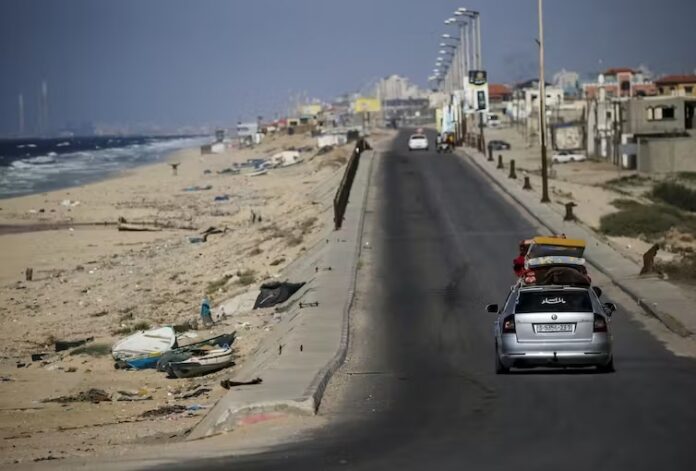Jane McAdam, UNSW Sydney and Ben Saul, University of Sydney
In conflicts around the world, evacuations have long been used to rescue people from serious harm. During the second world war, for instance, thousands of children across Europe were sent to rural areas or abroad under evacuation schemes initiated by governments and child welfare agencies.
The contrast in Gaza today is stark. We are witnessing an urgent, chaotic evacuation ordered by a belligerent party to the conflict, which is fast becoming a humanitarian catastrophe. Israel has told 1.1 million people in northern Gaza to move to the south ahead of an impending ground invasion.
Put yourself, your family, your friends or colleagues into this horror for a moment. How would you evacuate if you or your child was sick? How would you get your elderly parents out if they couldn’t walk? How would you move rapidly to southern Gaza if you had no fuel or transport?
Any of this would be hard at the best of times, let alone in the middle of a war zone, on short notice and with nowhere safe to go. As one 20-year-old woman, who had tried to flee south, said:
I was terrified, I thought I was about to die […] They told us to escape and then they bomb people on the road. My father drove back to Gaza City. He said if we are dying anyway, let’s be at home in Gaza.
Evacuating civilians under international law
Evacuations in armed conflict are strictly governed by international humanitarian law, which seeks to balance military and humanitarian needs. Israel’s warning to civilians in Gaza of impending attacks must be “effective”, meaning it must not only reach people but allow them sufficient time to evacuate safely.
The extremely tight time-frame Israel has given Gaza residents to leave is insufficient and unrealistic for an evacuation of this scale, especially amid its fast-tempo bombardment across the strip and under conditions of total siege.
Israel must also ensure evacuated civilians have the means to survive. International law requires it to allow and facilitate the rapid and unimpeded passage of humanitarian relief for civilians in need. This includes food, water, medical supplies, clothing, bedding, shelter, heating fuel and other supplies and services essential for survival. The starvation of civilians is a war crime.
Yet, Israel unlawfully imposed a “complete siege” of Gaza in response to the Hamas attacks on Israeli border communities last week, ordering no electricity, food, water or gas into the territory.
Cramming more than a million extra people into southern Gaza – doubling its population – will also place impossible strains on its infrastructure, which has already been much degraded by 16 years of blockade.
There is debate over whether Gaza is still legally “occupied” by Israel since the withdrawal of its ground forces in 2005.
The traditional view is that occupation requires Israeli “boots on the ground” to administer Gaza from within. A more contemporary view is that Israel still retains a sufficiently high level of control over life in Gaza, despite its withdrawal of troops. If it is occupied, additional legal rules apply to the present situation.
As an occupying power under international humanitarian law, Israel may order an evacuation for imperative military reasons, or for the safety of civilians, but civilians must still be protected. Specifically, Israel must ensure displaced civilians have adequate shelter, hygiene, health, safety and nutrition, and that family members are not separated.
The specific needs of children, expectant and nursing mothers, people with disabilities and the elderly must be addressed. All of this is on top of the requirement to allow rapid and unimpeded humanitarian relief, which applies regardless of whether Gaza is considered occupied.
US Secretary of State Antony Blinken says the US and Israel have agreed to work on a plan to get humanitarian aid into Gaza and consider ideas for “safe zones” that would theoretically be shielded from strikes, but nothing has been implemented yet, with the situation continuing to deteriorate.
‘Extremely dangerous’
The UN relief agency for Palestinians says it has run out of capacity to help, declaring an “unprecedented humanitarian catastrophe”.
Gaza is being strangled and it seems that the world right now has lost its humanity.
The International Committee of the Red Cross, the custodian of the law of war, rarely publicly rebukes governments. However, it has also called the evacuation order illegal. UN Secretary-General António Guterres has condemned it, as well, saying it is “extremely dangerous” and potentially impossible.
The World Health Organization criticised Israel’s further orders to evacuate 22 hospitals in northern Gaza, stating that it would “further worsen the current humanitarian and public health catastrophe”.
Forcing more than 2,000 patients to relocate to southern Gaza, where health facilities are already running at maximum capacity and unable to absorb a dramatic rise in the number of patients, could be tantamount to a death sentence.
Treating Gazans as refugees
Gazans are also unable to reach safety in other countries. The border crossing into Egypt remains closed.
Many Palestinians do not want to leave their homeland if there’s a chance they won’t be allowed to return, a risk etched in their collective memory since the exodus of the 1948 war.
But those who do wish to leave are entitled to do so under international law, and other countries must not refuse them entry given the real risk to their lives.
Gazans are normally protected as refugees by the UN relief agency for Palestinians, under a bespoke legal regime.
However, the relief agency’s present inability to provide protection and assistance means Palestinian refugees who do reach another country should be automatically protected as refugees under the 1951 Refugee Convention, without the need for further status determination.
Anyone who refuses to evacuate Gaza – or simply cannot evacuate – remains protected as a civilian. People do not lose that right simply because they stay put.
Israel must take constant care to spare civilians and civilian objects from harm, avoid and minimise incidental civilian casualties and allow the unimpeded passage of humanitarian relief.
Jane McAdam, Scientia Professor and Director of the Kaldor Centre for International Refugee Law, UNSW Sydney and Ben Saul, Challis Chair of International Law, Sydney Law School, University of Sydney
This article is republished from The Conversation under a Creative Commons license. Read the original article.




















